Professionalism and Stakeholders in Education & Training Sector
VerifiedAdded on 2023/06/14
|14
|3756
|395
Report
AI Summary
This assignment provides a reflective account and case study exploring professional practice and development in the context of education and training. It examines the concept of professionalism and dual professionalism, highlighting the influence of professional values such as meeting organizational policies, promoting quality in teaching, and engaging in continuous professional development (CPD). The case study identifies the roles of stakeholders and external bodies in education, emphasizing the importance of accountability and partnership with employers. The assignment underscores the impact of these factors on the organization and delivery of education and training, ultimately contributing to improved teaching standards and student outcomes. Desklib offers this document as part of its collection of student-contributed assignments.
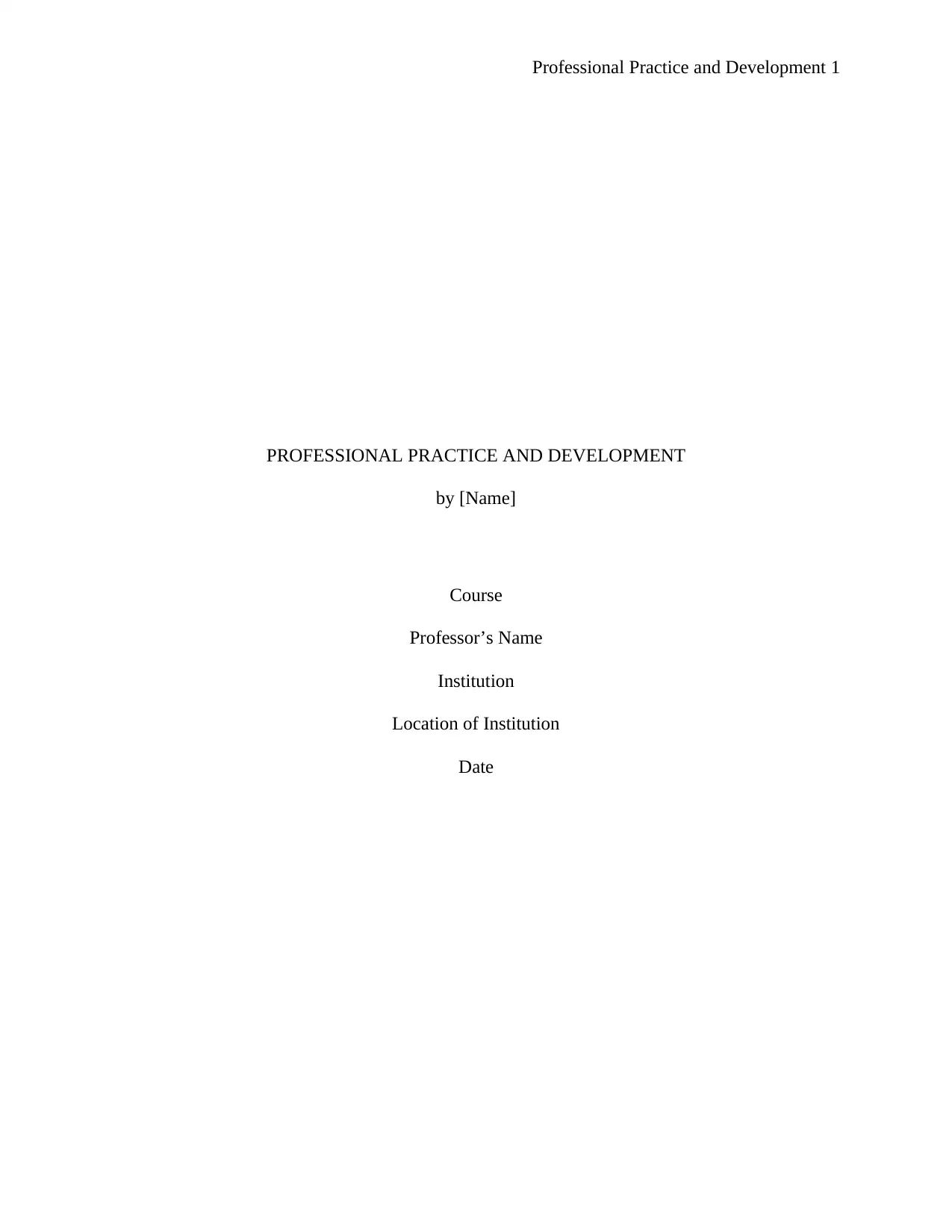
Professional Practice and Development 1
PROFESSIONAL PRACTICE AND DEVELOPMENT
by [Name]
Course
Professor’s Name
Institution
Location of Institution
Date
PROFESSIONAL PRACTICE AND DEVELOPMENT
by [Name]
Course
Professor’s Name
Institution
Location of Institution
Date
Paraphrase This Document
Need a fresh take? Get an instant paraphrase of this document with our AI Paraphraser
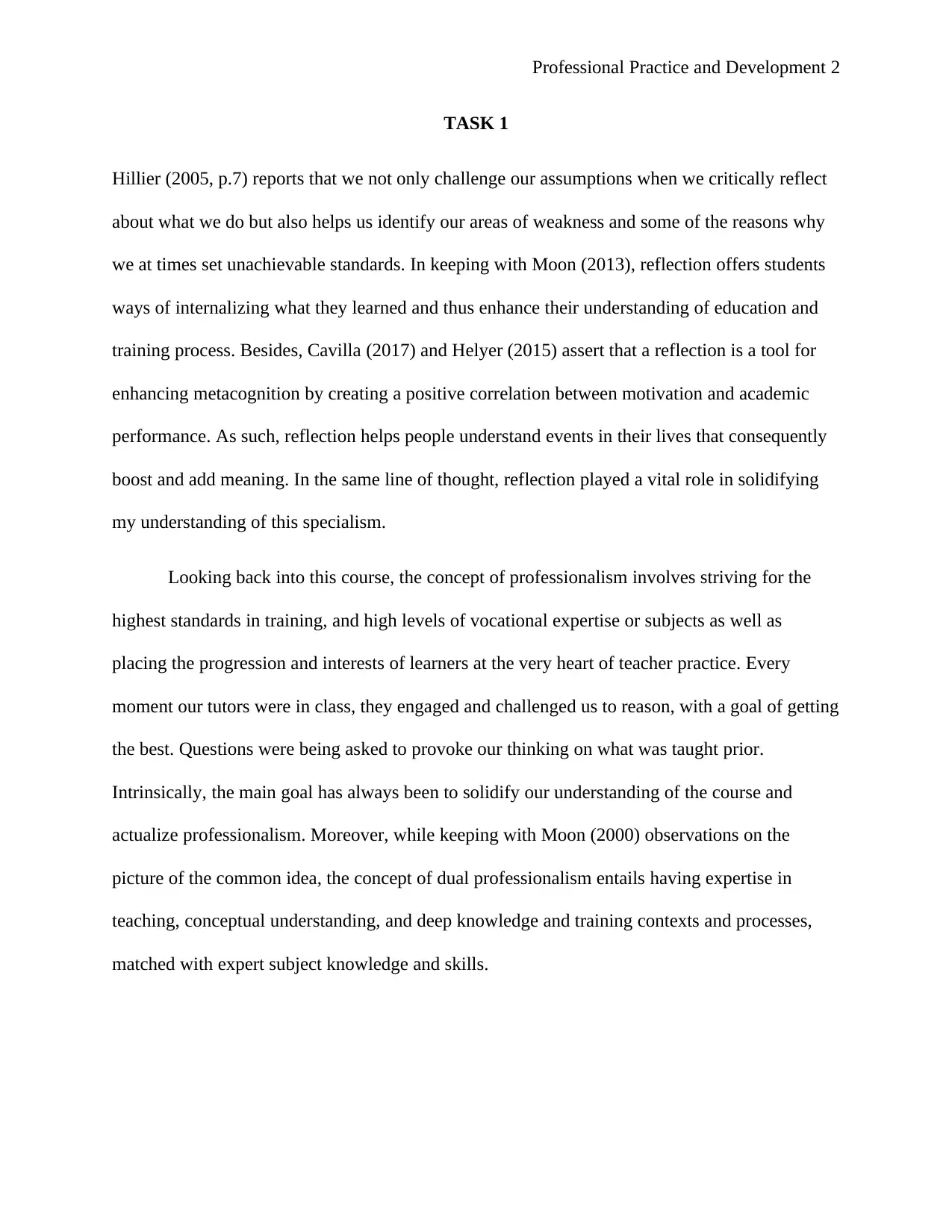
Professional Practice and Development 2
TASK 1
Hillier (2005, p.7) reports that we not only challenge our assumptions when we critically reflect
about what we do but also helps us identify our areas of weakness and some of the reasons why
we at times set unachievable standards. In keeping with Moon (2013), reflection offers students
ways of internalizing what they learned and thus enhance their understanding of education and
training process. Besides, Cavilla (2017) and Helyer (2015) assert that a reflection is a tool for
enhancing metacognition by creating a positive correlation between motivation and academic
performance. As such, reflection helps people understand events in their lives that consequently
boost and add meaning. In the same line of thought, reflection played a vital role in solidifying
my understanding of this specialism.
Looking back into this course, the concept of professionalism involves striving for the
highest standards in training, and high levels of vocational expertise or subjects as well as
placing the progression and interests of learners at the very heart of teacher practice. Every
moment our tutors were in class, they engaged and challenged us to reason, with a goal of getting
the best. Questions were being asked to provoke our thinking on what was taught prior.
Intrinsically, the main goal has always been to solidify our understanding of the course and
actualize professionalism. Moreover, while keeping with Moon (2000) observations on the
picture of the common idea, the concept of dual professionalism entails having expertise in
teaching, conceptual understanding, and deep knowledge and training contexts and processes,
matched with expert subject knowledge and skills.
TASK 1
Hillier (2005, p.7) reports that we not only challenge our assumptions when we critically reflect
about what we do but also helps us identify our areas of weakness and some of the reasons why
we at times set unachievable standards. In keeping with Moon (2013), reflection offers students
ways of internalizing what they learned and thus enhance their understanding of education and
training process. Besides, Cavilla (2017) and Helyer (2015) assert that a reflection is a tool for
enhancing metacognition by creating a positive correlation between motivation and academic
performance. As such, reflection helps people understand events in their lives that consequently
boost and add meaning. In the same line of thought, reflection played a vital role in solidifying
my understanding of this specialism.
Looking back into this course, the concept of professionalism involves striving for the
highest standards in training, and high levels of vocational expertise or subjects as well as
placing the progression and interests of learners at the very heart of teacher practice. Every
moment our tutors were in class, they engaged and challenged us to reason, with a goal of getting
the best. Questions were being asked to provoke our thinking on what was taught prior.
Intrinsically, the main goal has always been to solidify our understanding of the course and
actualize professionalism. Moreover, while keeping with Moon (2000) observations on the
picture of the common idea, the concept of dual professionalism entails having expertise in
teaching, conceptual understanding, and deep knowledge and training contexts and processes,
matched with expert subject knowledge and skills.
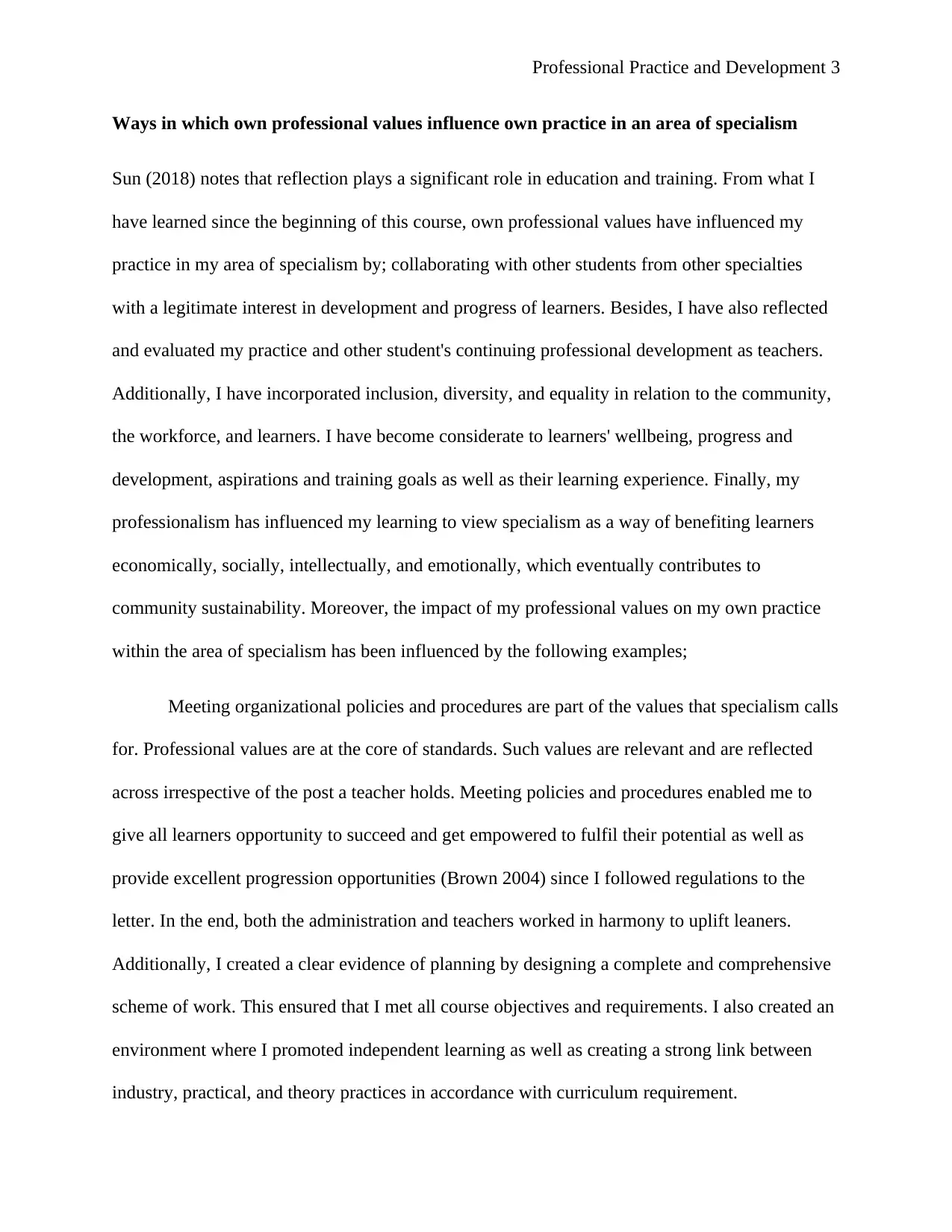
Professional Practice and Development 3
Ways in which own professional values influence own practice in an area of specialism
Sun (2018) notes that reflection plays a significant role in education and training. From what I
have learned since the beginning of this course, own professional values have influenced my
practice in my area of specialism by; collaborating with other students from other specialties
with a legitimate interest in development and progress of learners. Besides, I have also reflected
and evaluated my practice and other student's continuing professional development as teachers.
Additionally, I have incorporated inclusion, diversity, and equality in relation to the community,
the workforce, and learners. I have become considerate to learners' wellbeing, progress and
development, aspirations and training goals as well as their learning experience. Finally, my
professionalism has influenced my learning to view specialism as a way of benefiting learners
economically, socially, intellectually, and emotionally, which eventually contributes to
community sustainability. Moreover, the impact of my professional values on my own practice
within the area of specialism has been influenced by the following examples;
Meeting organizational policies and procedures are part of the values that specialism calls
for. Professional values are at the core of standards. Such values are relevant and are reflected
across irrespective of the post a teacher holds. Meeting policies and procedures enabled me to
give all learners opportunity to succeed and get empowered to fulfil their potential as well as
provide excellent progression opportunities (Brown 2004) since I followed regulations to the
letter. In the end, both the administration and teachers worked in harmony to uplift leaners.
Additionally, I created a clear evidence of planning by designing a complete and comprehensive
scheme of work. This ensured that I met all course objectives and requirements. I also created an
environment where I promoted independent learning as well as creating a strong link between
industry, practical, and theory practices in accordance with curriculum requirement.
Ways in which own professional values influence own practice in an area of specialism
Sun (2018) notes that reflection plays a significant role in education and training. From what I
have learned since the beginning of this course, own professional values have influenced my
practice in my area of specialism by; collaborating with other students from other specialties
with a legitimate interest in development and progress of learners. Besides, I have also reflected
and evaluated my practice and other student's continuing professional development as teachers.
Additionally, I have incorporated inclusion, diversity, and equality in relation to the community,
the workforce, and learners. I have become considerate to learners' wellbeing, progress and
development, aspirations and training goals as well as their learning experience. Finally, my
professionalism has influenced my learning to view specialism as a way of benefiting learners
economically, socially, intellectually, and emotionally, which eventually contributes to
community sustainability. Moreover, the impact of my professional values on my own practice
within the area of specialism has been influenced by the following examples;
Meeting organizational policies and procedures are part of the values that specialism calls
for. Professional values are at the core of standards. Such values are relevant and are reflected
across irrespective of the post a teacher holds. Meeting policies and procedures enabled me to
give all learners opportunity to succeed and get empowered to fulfil their potential as well as
provide excellent progression opportunities (Brown 2004) since I followed regulations to the
letter. In the end, both the administration and teachers worked in harmony to uplift leaners.
Additionally, I created a clear evidence of planning by designing a complete and comprehensive
scheme of work. This ensured that I met all course objectives and requirements. I also created an
environment where I promoted independent learning as well as creating a strong link between
industry, practical, and theory practices in accordance with curriculum requirement.
⊘ This is a preview!⊘
Do you want full access?
Subscribe today to unlock all pages.

Trusted by 1+ million students worldwide
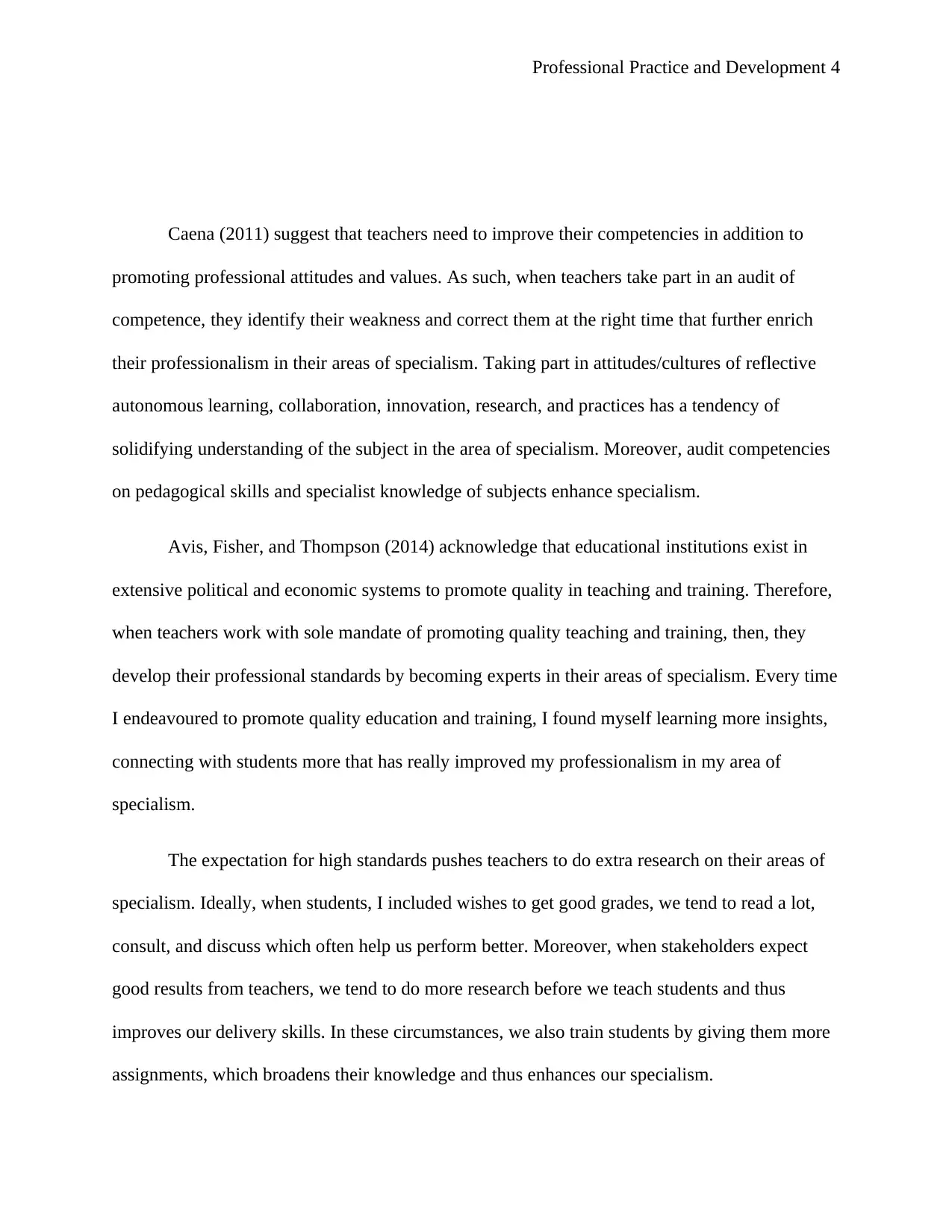
Professional Practice and Development 4
Caena (2011) suggest that teachers need to improve their competencies in addition to
promoting professional attitudes and values. As such, when teachers take part in an audit of
competence, they identify their weakness and correct them at the right time that further enrich
their professionalism in their areas of specialism. Taking part in attitudes/cultures of reflective
autonomous learning, collaboration, innovation, research, and practices has a tendency of
solidifying understanding of the subject in the area of specialism. Moreover, audit competencies
on pedagogical skills and specialist knowledge of subjects enhance specialism.
Avis, Fisher, and Thompson (2014) acknowledge that educational institutions exist in
extensive political and economic systems to promote quality in teaching and training. Therefore,
when teachers work with sole mandate of promoting quality teaching and training, then, they
develop their professional standards by becoming experts in their areas of specialism. Every time
I endeavoured to promote quality education and training, I found myself learning more insights,
connecting with students more that has really improved my professionalism in my area of
specialism.
The expectation for high standards pushes teachers to do extra research on their areas of
specialism. Ideally, when students, I included wishes to get good grades, we tend to read a lot,
consult, and discuss which often help us perform better. Moreover, when stakeholders expect
good results from teachers, we tend to do more research before we teach students and thus
improves our delivery skills. In these circumstances, we also train students by giving them more
assignments, which broadens their knowledge and thus enhances our specialism.
Caena (2011) suggest that teachers need to improve their competencies in addition to
promoting professional attitudes and values. As such, when teachers take part in an audit of
competence, they identify their weakness and correct them at the right time that further enrich
their professionalism in their areas of specialism. Taking part in attitudes/cultures of reflective
autonomous learning, collaboration, innovation, research, and practices has a tendency of
solidifying understanding of the subject in the area of specialism. Moreover, audit competencies
on pedagogical skills and specialist knowledge of subjects enhance specialism.
Avis, Fisher, and Thompson (2014) acknowledge that educational institutions exist in
extensive political and economic systems to promote quality in teaching and training. Therefore,
when teachers work with sole mandate of promoting quality teaching and training, then, they
develop their professional standards by becoming experts in their areas of specialism. Every time
I endeavoured to promote quality education and training, I found myself learning more insights,
connecting with students more that has really improved my professionalism in my area of
specialism.
The expectation for high standards pushes teachers to do extra research on their areas of
specialism. Ideally, when students, I included wishes to get good grades, we tend to read a lot,
consult, and discuss which often help us perform better. Moreover, when stakeholders expect
good results from teachers, we tend to do more research before we teach students and thus
improves our delivery skills. In these circumstances, we also train students by giving them more
assignments, which broadens their knowledge and thus enhances our specialism.
Paraphrase This Document
Need a fresh take? Get an instant paraphrase of this document with our AI Paraphraser
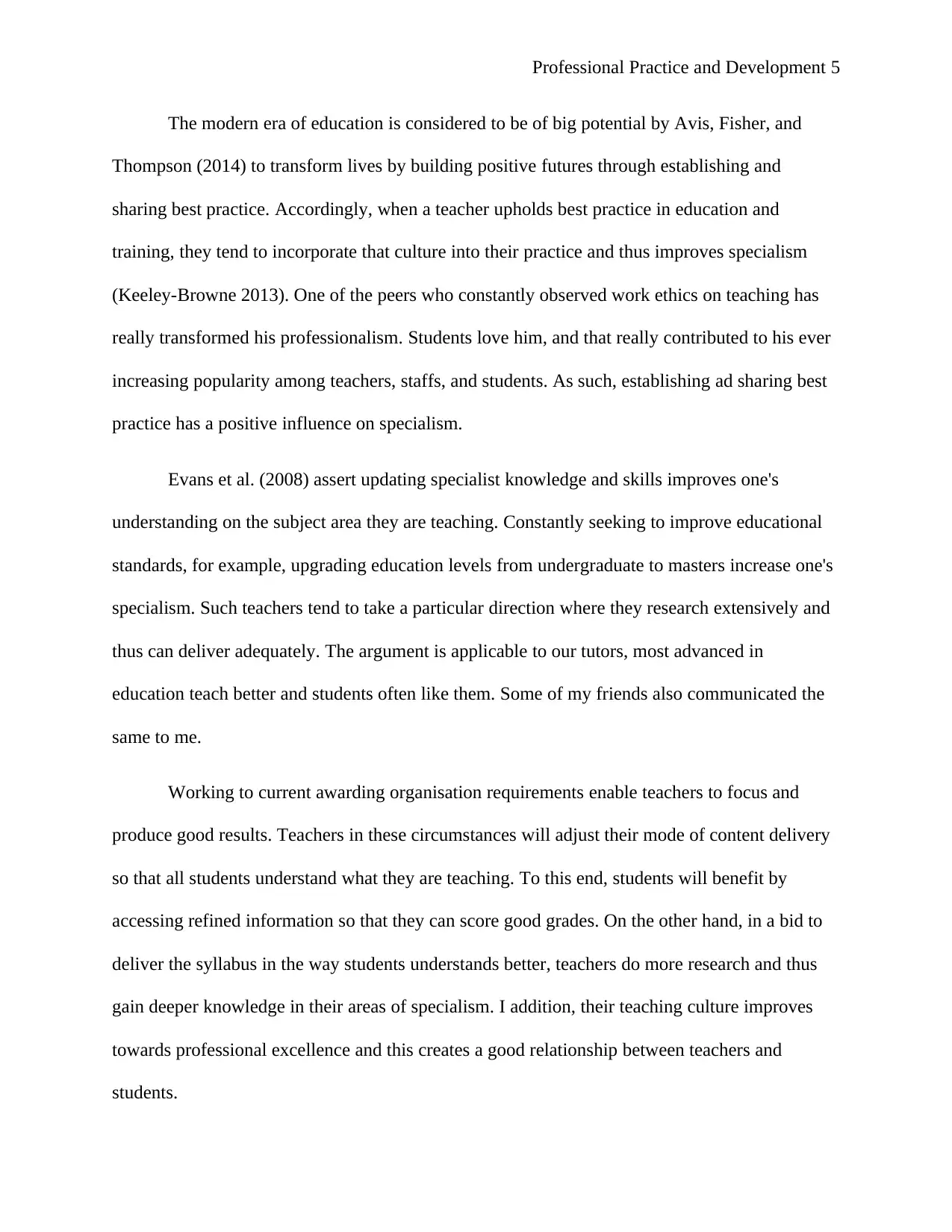
Professional Practice and Development 5
The modern era of education is considered to be of big potential by Avis, Fisher, and
Thompson (2014) to transform lives by building positive futures through establishing and
sharing best practice. Accordingly, when a teacher upholds best practice in education and
training, they tend to incorporate that culture into their practice and thus improves specialism
(Keeley-Browne 2013). One of the peers who constantly observed work ethics on teaching has
really transformed his professionalism. Students love him, and that really contributed to his ever
increasing popularity among teachers, staffs, and students. As such, establishing ad sharing best
practice has a positive influence on specialism.
Evans et al. (2008) assert updating specialist knowledge and skills improves one's
understanding on the subject area they are teaching. Constantly seeking to improve educational
standards, for example, upgrading education levels from undergraduate to masters increase one's
specialism. Such teachers tend to take a particular direction where they research extensively and
thus can deliver adequately. The argument is applicable to our tutors, most advanced in
education teach better and students often like them. Some of my friends also communicated the
same to me.
Working to current awarding organisation requirements enable teachers to focus and
produce good results. Teachers in these circumstances will adjust their mode of content delivery
so that all students understand what they are teaching. To this end, students will benefit by
accessing refined information so that they can score good grades. On the other hand, in a bid to
deliver the syllabus in the way students understands better, teachers do more research and thus
gain deeper knowledge in their areas of specialism. I addition, their teaching culture improves
towards professional excellence and this creates a good relationship between teachers and
students.
The modern era of education is considered to be of big potential by Avis, Fisher, and
Thompson (2014) to transform lives by building positive futures through establishing and
sharing best practice. Accordingly, when a teacher upholds best practice in education and
training, they tend to incorporate that culture into their practice and thus improves specialism
(Keeley-Browne 2013). One of the peers who constantly observed work ethics on teaching has
really transformed his professionalism. Students love him, and that really contributed to his ever
increasing popularity among teachers, staffs, and students. As such, establishing ad sharing best
practice has a positive influence on specialism.
Evans et al. (2008) assert updating specialist knowledge and skills improves one's
understanding on the subject area they are teaching. Constantly seeking to improve educational
standards, for example, upgrading education levels from undergraduate to masters increase one's
specialism. Such teachers tend to take a particular direction where they research extensively and
thus can deliver adequately. The argument is applicable to our tutors, most advanced in
education teach better and students often like them. Some of my friends also communicated the
same to me.
Working to current awarding organisation requirements enable teachers to focus and
produce good results. Teachers in these circumstances will adjust their mode of content delivery
so that all students understand what they are teaching. To this end, students will benefit by
accessing refined information so that they can score good grades. On the other hand, in a bid to
deliver the syllabus in the way students understands better, teachers do more research and thus
gain deeper knowledge in their areas of specialism. I addition, their teaching culture improves
towards professional excellence and this creates a good relationship between teachers and
students.
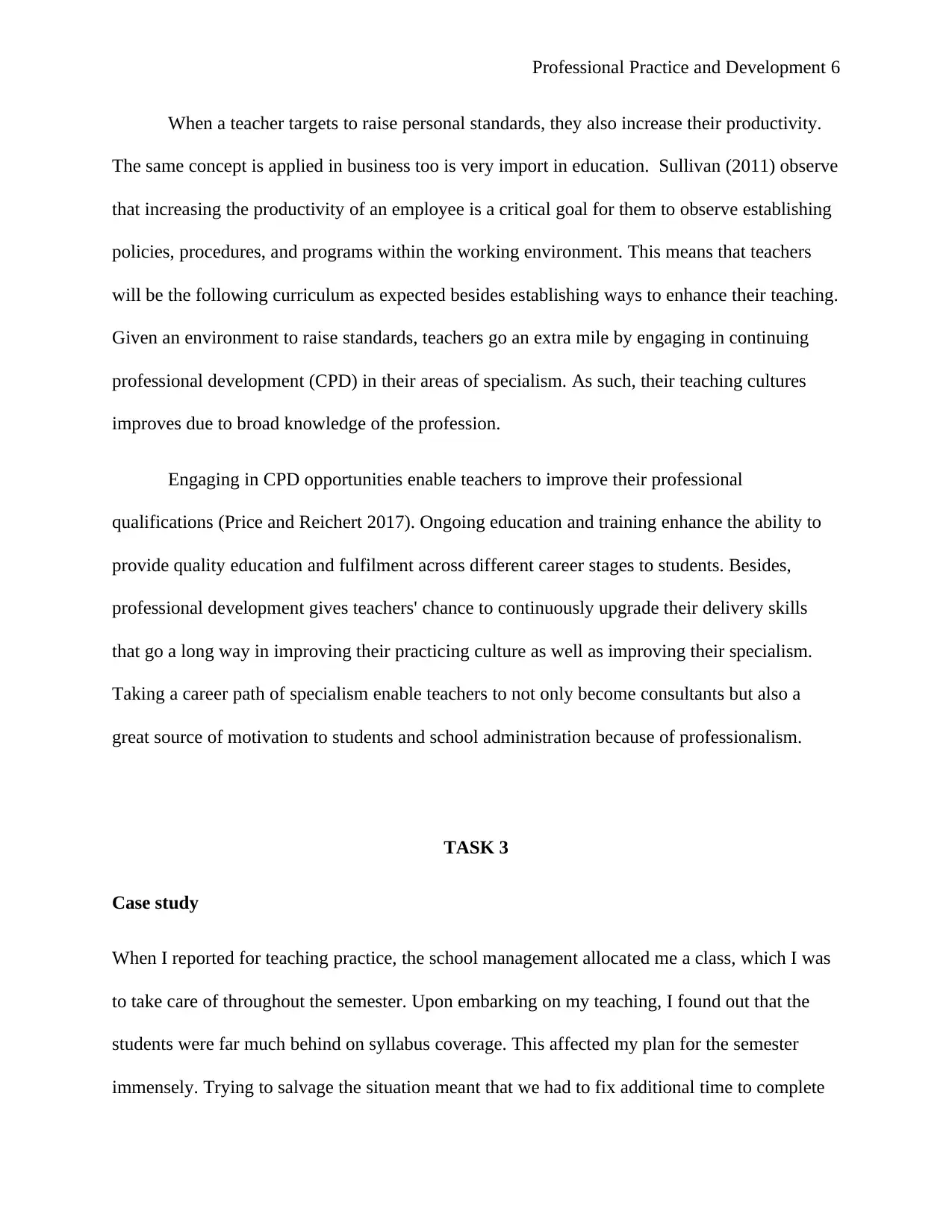
Professional Practice and Development 6
When a teacher targets to raise personal standards, they also increase their productivity.
The same concept is applied in business too is very import in education. Sullivan (2011) observe
that increasing the productivity of an employee is a critical goal for them to observe establishing
policies, procedures, and programs within the working environment. This means that teachers
will be the following curriculum as expected besides establishing ways to enhance their teaching.
Given an environment to raise standards, teachers go an extra mile by engaging in continuing
professional development (CPD) in their areas of specialism. As such, their teaching cultures
improves due to broad knowledge of the profession.
Engaging in CPD opportunities enable teachers to improve their professional
qualifications (Price and Reichert 2017). Ongoing education and training enhance the ability to
provide quality education and fulfilment across different career stages to students. Besides,
professional development gives teachers' chance to continuously upgrade their delivery skills
that go a long way in improving their practicing culture as well as improving their specialism.
Taking a career path of specialism enable teachers to not only become consultants but also a
great source of motivation to students and school administration because of professionalism.
TASK 3
Case study
When I reported for teaching practice, the school management allocated me a class, which I was
to take care of throughout the semester. Upon embarking on my teaching, I found out that the
students were far much behind on syllabus coverage. This affected my plan for the semester
immensely. Trying to salvage the situation meant that we had to fix additional time to complete
When a teacher targets to raise personal standards, they also increase their productivity.
The same concept is applied in business too is very import in education. Sullivan (2011) observe
that increasing the productivity of an employee is a critical goal for them to observe establishing
policies, procedures, and programs within the working environment. This means that teachers
will be the following curriculum as expected besides establishing ways to enhance their teaching.
Given an environment to raise standards, teachers go an extra mile by engaging in continuing
professional development (CPD) in their areas of specialism. As such, their teaching cultures
improves due to broad knowledge of the profession.
Engaging in CPD opportunities enable teachers to improve their professional
qualifications (Price and Reichert 2017). Ongoing education and training enhance the ability to
provide quality education and fulfilment across different career stages to students. Besides,
professional development gives teachers' chance to continuously upgrade their delivery skills
that go a long way in improving their practicing culture as well as improving their specialism.
Taking a career path of specialism enable teachers to not only become consultants but also a
great source of motivation to students and school administration because of professionalism.
TASK 3
Case study
When I reported for teaching practice, the school management allocated me a class, which I was
to take care of throughout the semester. Upon embarking on my teaching, I found out that the
students were far much behind on syllabus coverage. This affected my plan for the semester
immensely. Trying to salvage the situation meant that we had to fix additional time to complete
⊘ This is a preview!⊘
Do you want full access?
Subscribe today to unlock all pages.

Trusted by 1+ million students worldwide
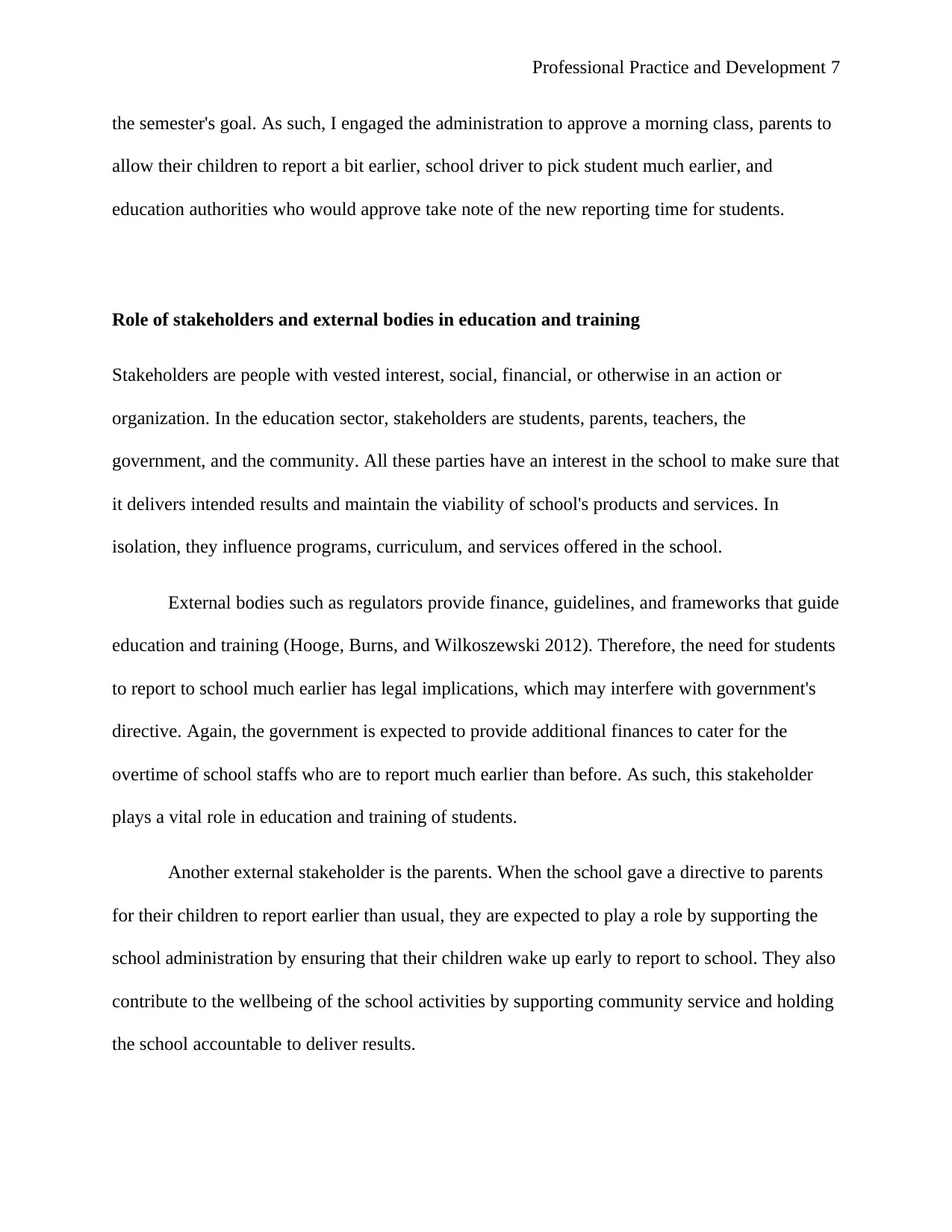
Professional Practice and Development 7
the semester's goal. As such, I engaged the administration to approve a morning class, parents to
allow their children to report a bit earlier, school driver to pick student much earlier, and
education authorities who would approve take note of the new reporting time for students.
Role of stakeholders and external bodies in education and training
Stakeholders are people with vested interest, social, financial, or otherwise in an action or
organization. In the education sector, stakeholders are students, parents, teachers, the
government, and the community. All these parties have an interest in the school to make sure that
it delivers intended results and maintain the viability of school's products and services. In
isolation, they influence programs, curriculum, and services offered in the school.
External bodies such as regulators provide finance, guidelines, and frameworks that guide
education and training (Hooge, Burns, and Wilkoszewski 2012). Therefore, the need for students
to report to school much earlier has legal implications, which may interfere with government's
directive. Again, the government is expected to provide additional finances to cater for the
overtime of school staffs who are to report much earlier than before. As such, this stakeholder
plays a vital role in education and training of students.
Another external stakeholder is the parents. When the school gave a directive to parents
for their children to report earlier than usual, they are expected to play a role by supporting the
school administration by ensuring that their children wake up early to report to school. They also
contribute to the wellbeing of the school activities by supporting community service and holding
the school accountable to deliver results.
the semester's goal. As such, I engaged the administration to approve a morning class, parents to
allow their children to report a bit earlier, school driver to pick student much earlier, and
education authorities who would approve take note of the new reporting time for students.
Role of stakeholders and external bodies in education and training
Stakeholders are people with vested interest, social, financial, or otherwise in an action or
organization. In the education sector, stakeholders are students, parents, teachers, the
government, and the community. All these parties have an interest in the school to make sure that
it delivers intended results and maintain the viability of school's products and services. In
isolation, they influence programs, curriculum, and services offered in the school.
External bodies such as regulators provide finance, guidelines, and frameworks that guide
education and training (Hooge, Burns, and Wilkoszewski 2012). Therefore, the need for students
to report to school much earlier has legal implications, which may interfere with government's
directive. Again, the government is expected to provide additional finances to cater for the
overtime of school staffs who are to report much earlier than before. As such, this stakeholder
plays a vital role in education and training of students.
Another external stakeholder is the parents. When the school gave a directive to parents
for their children to report earlier than usual, they are expected to play a role by supporting the
school administration by ensuring that their children wake up early to report to school. They also
contribute to the wellbeing of the school activities by supporting community service and holding
the school accountable to deliver results.
Paraphrase This Document
Need a fresh take? Get an instant paraphrase of this document with our AI Paraphraser
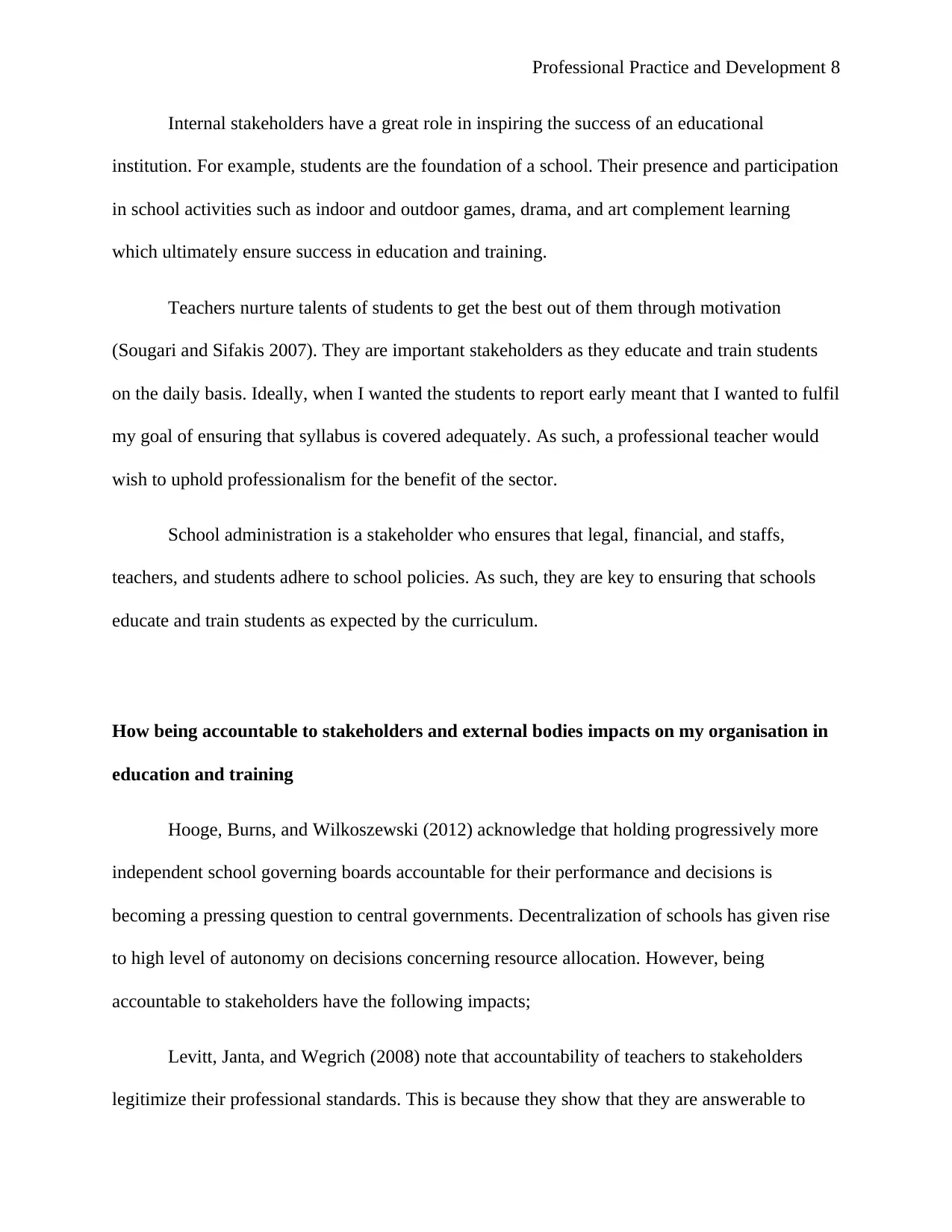
Professional Practice and Development 8
Internal stakeholders have a great role in inspiring the success of an educational
institution. For example, students are the foundation of a school. Their presence and participation
in school activities such as indoor and outdoor games, drama, and art complement learning
which ultimately ensure success in education and training.
Teachers nurture talents of students to get the best out of them through motivation
(Sougari and Sifakis 2007). They are important stakeholders as they educate and train students
on the daily basis. Ideally, when I wanted the students to report early meant that I wanted to fulfil
my goal of ensuring that syllabus is covered adequately. As such, a professional teacher would
wish to uphold professionalism for the benefit of the sector.
School administration is a stakeholder who ensures that legal, financial, and staffs,
teachers, and students adhere to school policies. As such, they are key to ensuring that schools
educate and train students as expected by the curriculum.
How being accountable to stakeholders and external bodies impacts on my organisation in
education and training
Hooge, Burns, and Wilkoszewski (2012) acknowledge that holding progressively more
independent school governing boards accountable for their performance and decisions is
becoming a pressing question to central governments. Decentralization of schools has given rise
to high level of autonomy on decisions concerning resource allocation. However, being
accountable to stakeholders have the following impacts;
Levitt, Janta, and Wegrich (2008) note that accountability of teachers to stakeholders
legitimize their professional standards. This is because they show that they are answerable to
Internal stakeholders have a great role in inspiring the success of an educational
institution. For example, students are the foundation of a school. Their presence and participation
in school activities such as indoor and outdoor games, drama, and art complement learning
which ultimately ensure success in education and training.
Teachers nurture talents of students to get the best out of them through motivation
(Sougari and Sifakis 2007). They are important stakeholders as they educate and train students
on the daily basis. Ideally, when I wanted the students to report early meant that I wanted to fulfil
my goal of ensuring that syllabus is covered adequately. As such, a professional teacher would
wish to uphold professionalism for the benefit of the sector.
School administration is a stakeholder who ensures that legal, financial, and staffs,
teachers, and students adhere to school policies. As such, they are key to ensuring that schools
educate and train students as expected by the curriculum.
How being accountable to stakeholders and external bodies impacts on my organisation in
education and training
Hooge, Burns, and Wilkoszewski (2012) acknowledge that holding progressively more
independent school governing boards accountable for their performance and decisions is
becoming a pressing question to central governments. Decentralization of schools has given rise
to high level of autonomy on decisions concerning resource allocation. However, being
accountable to stakeholders have the following impacts;
Levitt, Janta, and Wegrich (2008) note that accountability of teachers to stakeholders
legitimize their professional standards. This is because they show that they are answerable to
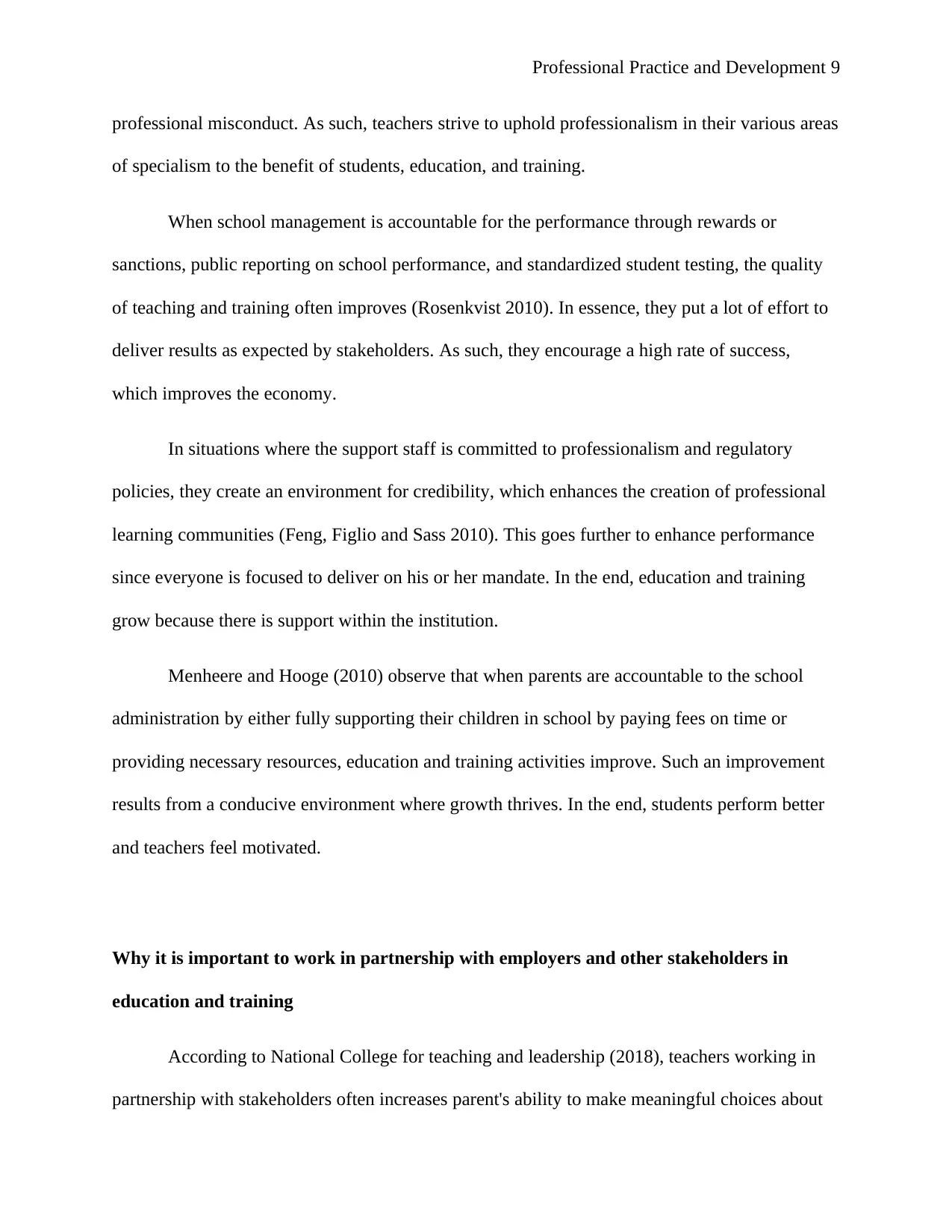
Professional Practice and Development 9
professional misconduct. As such, teachers strive to uphold professionalism in their various areas
of specialism to the benefit of students, education, and training.
When school management is accountable for the performance through rewards or
sanctions, public reporting on school performance, and standardized student testing, the quality
of teaching and training often improves (Rosenkvist 2010). In essence, they put a lot of effort to
deliver results as expected by stakeholders. As such, they encourage a high rate of success,
which improves the economy.
In situations where the support staff is committed to professionalism and regulatory
policies, they create an environment for credibility, which enhances the creation of professional
learning communities (Feng, Figlio and Sass 2010). This goes further to enhance performance
since everyone is focused to deliver on his or her mandate. In the end, education and training
grow because there is support within the institution.
Menheere and Hooge (2010) observe that when parents are accountable to the school
administration by either fully supporting their children in school by paying fees on time or
providing necessary resources, education and training activities improve. Such an improvement
results from a conducive environment where growth thrives. In the end, students perform better
and teachers feel motivated.
Why it is important to work in partnership with employers and other stakeholders in
education and training
According to National College for teaching and leadership (2018), teachers working in
partnership with stakeholders often increases parent's ability to make meaningful choices about
professional misconduct. As such, teachers strive to uphold professionalism in their various areas
of specialism to the benefit of students, education, and training.
When school management is accountable for the performance through rewards or
sanctions, public reporting on school performance, and standardized student testing, the quality
of teaching and training often improves (Rosenkvist 2010). In essence, they put a lot of effort to
deliver results as expected by stakeholders. As such, they encourage a high rate of success,
which improves the economy.
In situations where the support staff is committed to professionalism and regulatory
policies, they create an environment for credibility, which enhances the creation of professional
learning communities (Feng, Figlio and Sass 2010). This goes further to enhance performance
since everyone is focused to deliver on his or her mandate. In the end, education and training
grow because there is support within the institution.
Menheere and Hooge (2010) observe that when parents are accountable to the school
administration by either fully supporting their children in school by paying fees on time or
providing necessary resources, education and training activities improve. Such an improvement
results from a conducive environment where growth thrives. In the end, students perform better
and teachers feel motivated.
Why it is important to work in partnership with employers and other stakeholders in
education and training
According to National College for teaching and leadership (2018), teachers working in
partnership with stakeholders often increases parent's ability to make meaningful choices about
⊘ This is a preview!⊘
Do you want full access?
Subscribe today to unlock all pages.

Trusted by 1+ million students worldwide
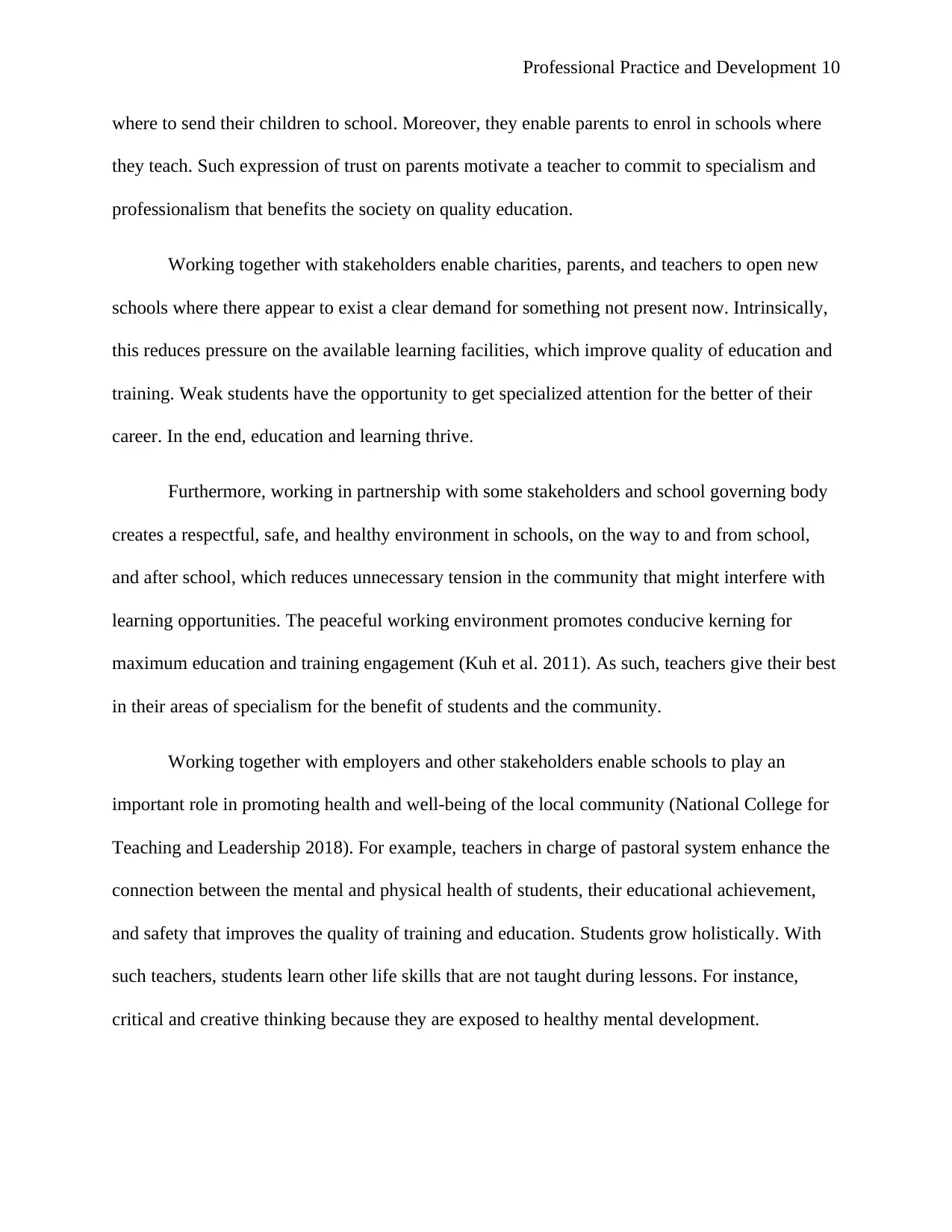
Professional Practice and Development 10
where to send their children to school. Moreover, they enable parents to enrol in schools where
they teach. Such expression of trust on parents motivate a teacher to commit to specialism and
professionalism that benefits the society on quality education.
Working together with stakeholders enable charities, parents, and teachers to open new
schools where there appear to exist a clear demand for something not present now. Intrinsically,
this reduces pressure on the available learning facilities, which improve quality of education and
training. Weak students have the opportunity to get specialized attention for the better of their
career. In the end, education and learning thrive.
Furthermore, working in partnership with some stakeholders and school governing body
creates a respectful, safe, and healthy environment in schools, on the way to and from school,
and after school, which reduces unnecessary tension in the community that might interfere with
learning opportunities. The peaceful working environment promotes conducive kerning for
maximum education and training engagement (Kuh et al. 2011). As such, teachers give their best
in their areas of specialism for the benefit of students and the community.
Working together with employers and other stakeholders enable schools to play an
important role in promoting health and well-being of the local community (National College for
Teaching and Leadership 2018). For example, teachers in charge of pastoral system enhance the
connection between the mental and physical health of students, their educational achievement,
and safety that improves the quality of training and education. Students grow holistically. With
such teachers, students learn other life skills that are not taught during lessons. For instance,
critical and creative thinking because they are exposed to healthy mental development.
where to send their children to school. Moreover, they enable parents to enrol in schools where
they teach. Such expression of trust on parents motivate a teacher to commit to specialism and
professionalism that benefits the society on quality education.
Working together with stakeholders enable charities, parents, and teachers to open new
schools where there appear to exist a clear demand for something not present now. Intrinsically,
this reduces pressure on the available learning facilities, which improve quality of education and
training. Weak students have the opportunity to get specialized attention for the better of their
career. In the end, education and learning thrive.
Furthermore, working in partnership with some stakeholders and school governing body
creates a respectful, safe, and healthy environment in schools, on the way to and from school,
and after school, which reduces unnecessary tension in the community that might interfere with
learning opportunities. The peaceful working environment promotes conducive kerning for
maximum education and training engagement (Kuh et al. 2011). As such, teachers give their best
in their areas of specialism for the benefit of students and the community.
Working together with employers and other stakeholders enable schools to play an
important role in promoting health and well-being of the local community (National College for
Teaching and Leadership 2018). For example, teachers in charge of pastoral system enhance the
connection between the mental and physical health of students, their educational achievement,
and safety that improves the quality of training and education. Students grow holistically. With
such teachers, students learn other life skills that are not taught during lessons. For instance,
critical and creative thinking because they are exposed to healthy mental development.
Paraphrase This Document
Need a fresh take? Get an instant paraphrase of this document with our AI Paraphraser
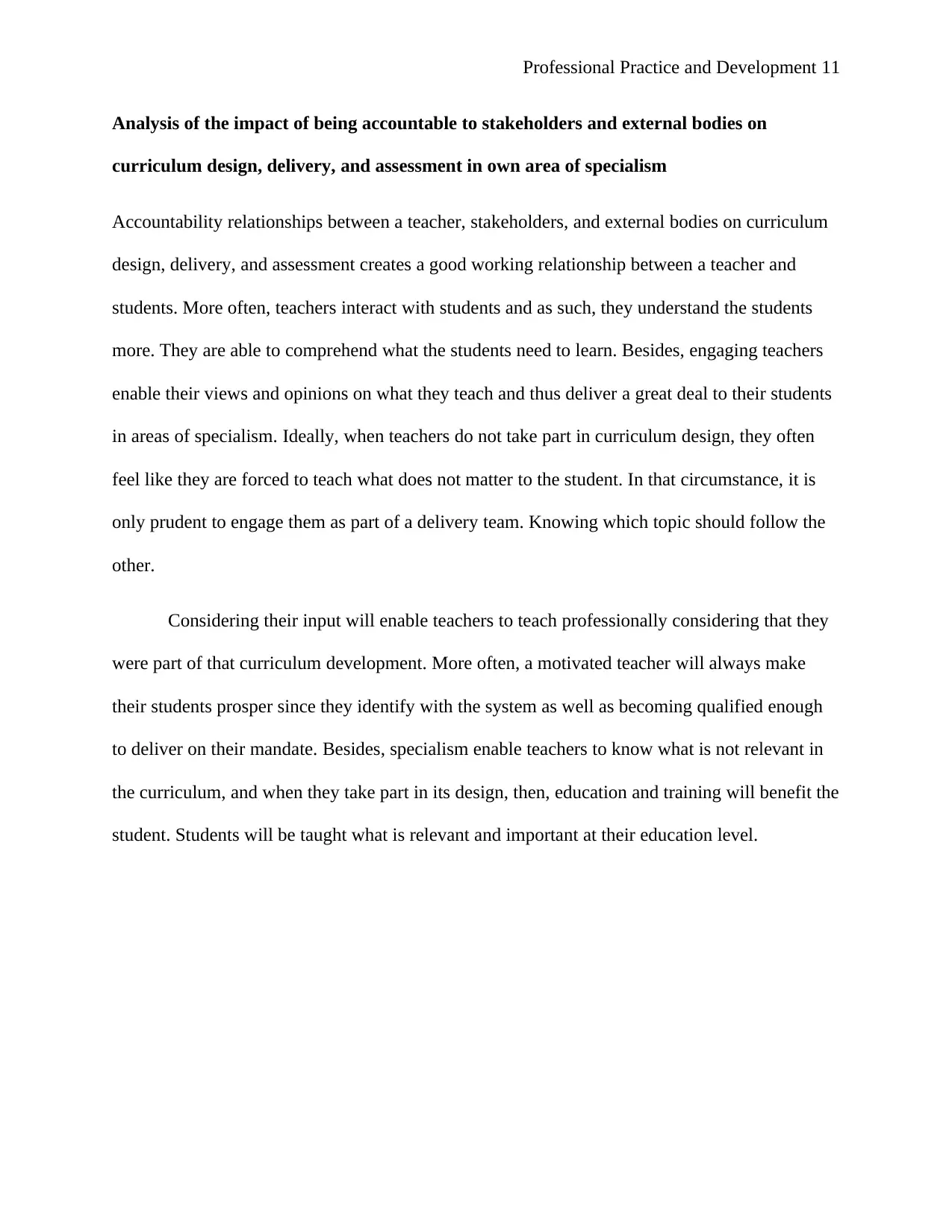
Professional Practice and Development 11
Analysis of the impact of being accountable to stakeholders and external bodies on
curriculum design, delivery, and assessment in own area of specialism
Accountability relationships between a teacher, stakeholders, and external bodies on curriculum
design, delivery, and assessment creates a good working relationship between a teacher and
students. More often, teachers interact with students and as such, they understand the students
more. They are able to comprehend what the students need to learn. Besides, engaging teachers
enable their views and opinions on what they teach and thus deliver a great deal to their students
in areas of specialism. Ideally, when teachers do not take part in curriculum design, they often
feel like they are forced to teach what does not matter to the student. In that circumstance, it is
only prudent to engage them as part of a delivery team. Knowing which topic should follow the
other.
Considering their input will enable teachers to teach professionally considering that they
were part of that curriculum development. More often, a motivated teacher will always make
their students prosper since they identify with the system as well as becoming qualified enough
to deliver on their mandate. Besides, specialism enable teachers to know what is not relevant in
the curriculum, and when they take part in its design, then, education and training will benefit the
student. Students will be taught what is relevant and important at their education level.
Analysis of the impact of being accountable to stakeholders and external bodies on
curriculum design, delivery, and assessment in own area of specialism
Accountability relationships between a teacher, stakeholders, and external bodies on curriculum
design, delivery, and assessment creates a good working relationship between a teacher and
students. More often, teachers interact with students and as such, they understand the students
more. They are able to comprehend what the students need to learn. Besides, engaging teachers
enable their views and opinions on what they teach and thus deliver a great deal to their students
in areas of specialism. Ideally, when teachers do not take part in curriculum design, they often
feel like they are forced to teach what does not matter to the student. In that circumstance, it is
only prudent to engage them as part of a delivery team. Knowing which topic should follow the
other.
Considering their input will enable teachers to teach professionally considering that they
were part of that curriculum development. More often, a motivated teacher will always make
their students prosper since they identify with the system as well as becoming qualified enough
to deliver on their mandate. Besides, specialism enable teachers to know what is not relevant in
the curriculum, and when they take part in its design, then, education and training will benefit the
student. Students will be taught what is relevant and important at their education level.
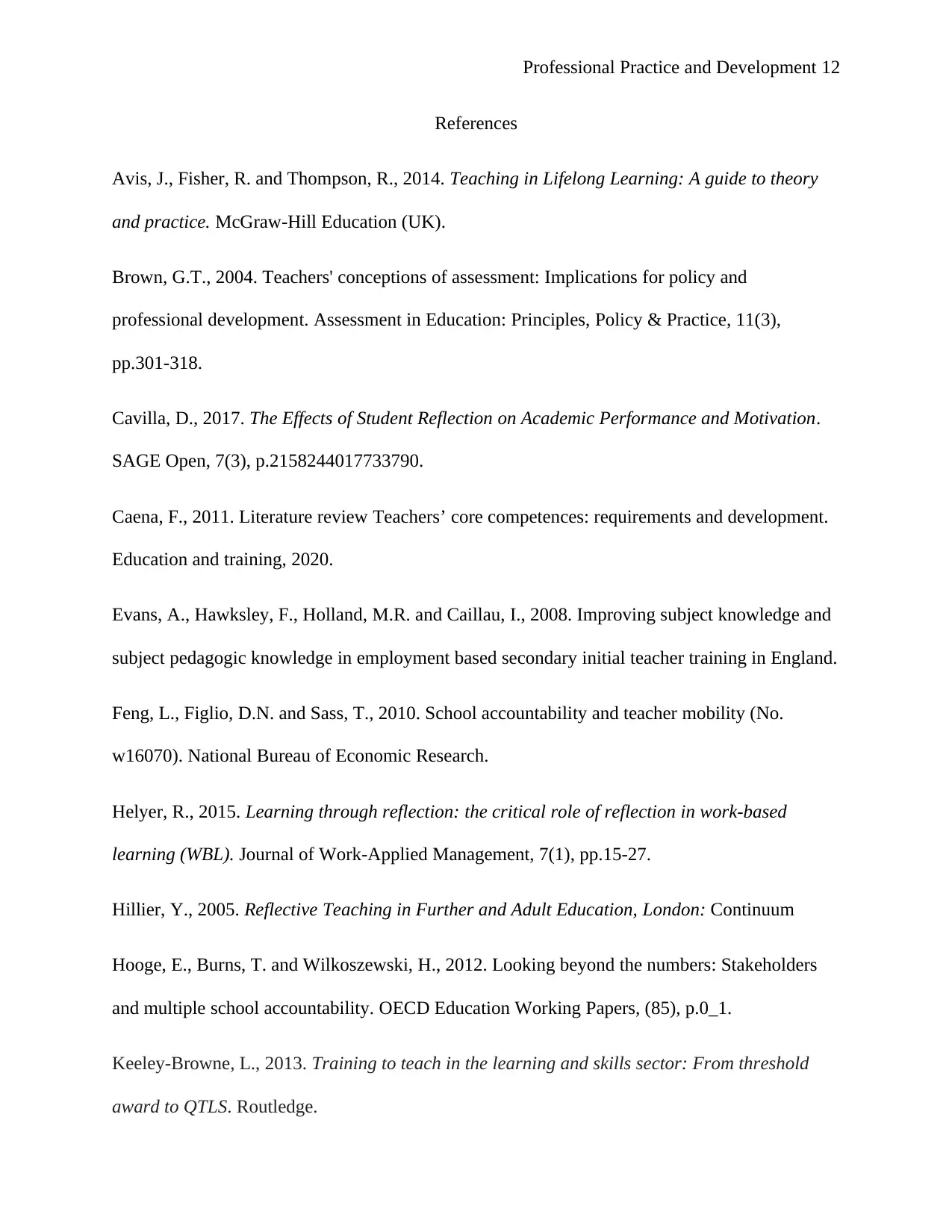
Professional Practice and Development 12
References
Avis, J., Fisher, R. and Thompson, R., 2014. Teaching in Lifelong Learning: A guide to theory
and practice. McGraw-Hill Education (UK).
Brown, G.T., 2004. Teachers' conceptions of assessment: Implications for policy and
professional development. Assessment in Education: Principles, Policy & Practice, 11(3),
pp.301-318.
Cavilla, D., 2017. The Effects of Student Reflection on Academic Performance and Motivation.
SAGE Open, 7(3), p.2158244017733790.
Caena, F., 2011. Literature review Teachers’ core competences: requirements and development.
Education and training, 2020.
Evans, A., Hawksley, F., Holland, M.R. and Caillau, I., 2008. Improving subject knowledge and
subject pedagogic knowledge in employment based secondary initial teacher training in England.
Feng, L., Figlio, D.N. and Sass, T., 2010. School accountability and teacher mobility (No.
w16070). National Bureau of Economic Research.
Helyer, R., 2015. Learning through reflection: the critical role of reflection in work-based
learning (WBL). Journal of Work-Applied Management, 7(1), pp.15-27.
Hillier, Y., 2005. Reflective Teaching in Further and Adult Education, London: Continuum
Hooge, E., Burns, T. and Wilkoszewski, H., 2012. Looking beyond the numbers: Stakeholders
and multiple school accountability. OECD Education Working Papers, (85), p.0_1.
Keeley-Browne, L., 2013. Training to teach in the learning and skills sector: From threshold
award to QTLS. Routledge.
References
Avis, J., Fisher, R. and Thompson, R., 2014. Teaching in Lifelong Learning: A guide to theory
and practice. McGraw-Hill Education (UK).
Brown, G.T., 2004. Teachers' conceptions of assessment: Implications for policy and
professional development. Assessment in Education: Principles, Policy & Practice, 11(3),
pp.301-318.
Cavilla, D., 2017. The Effects of Student Reflection on Academic Performance and Motivation.
SAGE Open, 7(3), p.2158244017733790.
Caena, F., 2011. Literature review Teachers’ core competences: requirements and development.
Education and training, 2020.
Evans, A., Hawksley, F., Holland, M.R. and Caillau, I., 2008. Improving subject knowledge and
subject pedagogic knowledge in employment based secondary initial teacher training in England.
Feng, L., Figlio, D.N. and Sass, T., 2010. School accountability and teacher mobility (No.
w16070). National Bureau of Economic Research.
Helyer, R., 2015. Learning through reflection: the critical role of reflection in work-based
learning (WBL). Journal of Work-Applied Management, 7(1), pp.15-27.
Hillier, Y., 2005. Reflective Teaching in Further and Adult Education, London: Continuum
Hooge, E., Burns, T. and Wilkoszewski, H., 2012. Looking beyond the numbers: Stakeholders
and multiple school accountability. OECD Education Working Papers, (85), p.0_1.
Keeley-Browne, L., 2013. Training to teach in the learning and skills sector: From threshold
award to QTLS. Routledge.
⊘ This is a preview!⊘
Do you want full access?
Subscribe today to unlock all pages.

Trusted by 1+ million students worldwide
1 out of 14
Related Documents
Your All-in-One AI-Powered Toolkit for Academic Success.
+13062052269
info@desklib.com
Available 24*7 on WhatsApp / Email
![[object Object]](/_next/static/media/star-bottom.7253800d.svg)
Unlock your academic potential
Copyright © 2020–2026 A2Z Services. All Rights Reserved. Developed and managed by ZUCOL.





